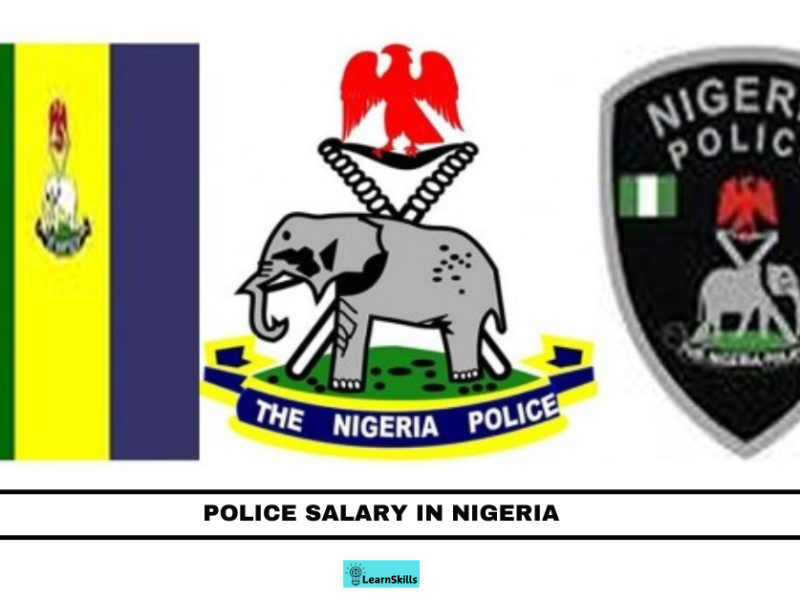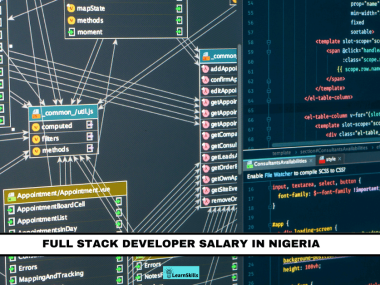Understanding the salary structure of the Nigeria Police Force (NPF) can provide valuable insight into the lives of police officers and the broader law enforcement system.
Police officers in Nigeria earn between ₦43,923 and ₦711,450 monthly, depending on their rank and role. This range reflects how salaries vary significantly from entry-level constables to higher-ranking officials like the Inspector General of Police.
While a police constable earns around ₦43,923 monthly, an Inspector can make about ₦700,000. Understanding these figures helps you appreciate the financial challenges and rewards faced by those serving in law enforcement in Nigeria.
Overview of Nigeria Police Force
The NPF plays a critical role in maintaining law and order in the country. Understanding its history, structure, and officers’ responsibilities helps you appreciate its impact on society.
History and Structure of NPF
The Nigeria Police Force was established in 1820 as a small group meant to enforce laws in the Lagos Colony. It has since evolved into a national force with over 300,000 personnel. The NPF has a clear command structure headed by the Inspector-General of Police.
This leader oversees numerous divisions, including Operations, Criminal Investigations, and Policy. State Commands are led by Commissioners of Police, who manage officers in their areas. Each local government also has police formations that report to the state level.
Roles and Responsibilities
The primary role of the Nigeria Police Force is to maintain peace and enforce laws. Officers are responsible for crime prevention, investigation, and apprehension of criminals.
They also handle public safety matters, including traffic regulation and crowd control during events.
Additionally, the police engage in community outreach to build trust with citizens. This helps foster cooperation in crime-solving efforts. Other functions include responding to emergencies and conducting investigations.
Police Ranks and Salary Structure
The Nigerian Police Force has a structured ranking system defining officers’ hierarchy. Each rank has specific duties and corresponding salaries that reflect the officer’s experience and responsibilities.
Ranking System and Progression
The Nigerian police ranking system starts with the Inspector-General of Police at the top and moves down to the Constable.
The major ranks in this hierarchy include:
- Inspector-General of Police
- Deputy Inspector-General of Police
- Assistant Inspector of Police
- Superintendent of Police
- Deputy Superintendent of Police
- Assistant Superintendent of Police
- Sergeant Major
- Sergeant
- Corporal
- Constable
Each rank requires specific qualifications and experience, allowing for progression as officers advance. Promotions usually depend on time served, performance, and passing standard exams.
Comparative Salary Breakdown
Salaries in the Nigerian Police vary widely based on rank. Here’s a breakdown of some key positions:
| Rank | Monthly Salary (₦) |
|---|---|
| Inspector-General of Police | ~₦700,000 |
| Deputy Inspector-General | ~₦600,000 |
| Assistant Inspector of Police | ~₦500,000 |
| Superintendent of Police | ~₦320,000 |
| Deputy Superintendent of Police | ~₦280,000 |
| Assistant Superintendent of Police | ~₦240,000 |
| Sergeant Major | ~₦130,000 |
| Sergeant | ~₦100,000 |
| Corporal | ~₦90,000 |
| Constable | ~₦86,000 |
These figures illustrate the salary differences among ranks. The salaries reflect the level of responsibility held by each rank within the force.
Salary Determinants and Benefits
Several factors play a critical role in determining police salaries in Nigeria. Additionally, officers may receive various benefits and allowances that enhance their overall compensation package.
Factors Affecting Salaries
Salaries for police officers in Nigeria vary based on rank, years of service, and educational qualifications.
Below are some key ranks and their corresponding salaries:
| Rank | Monthly Salary (₦) |
|---|---|
| Police Constable | 43,923 |
| Chief Superintendent of Police | 150,000 |
| Assistant Commissioner of Police | 500,000 |
| Inspector of Police | 700,000 |
| Inspector General of Police | 1,500,000 |
Promotions and rank advancements often lead to salary increases. The Police Service Commission sets these salary structures based on the available budget and performance evaluations.
Additional Benefits and Allowances
Police officers in Nigeria also receive various benefits that complement their salaries. These may include housing allowances, medical benefits, and transport allowances. Often, officers are provided uniforms, which reduce their expenses.
In addition to basic pay, some officers receive special bonuses for hazardous duty or working in challenging areas. For example, a corporal may receive an extra allowance for duties in high-risk locations.
These benefits help to create a more attractive overall compensation package, making the police force a viable career for many.
Challenges Facing Police Salary Administration
The Nigeria Police Force salary system faces significant challenges that impact officers at all levels. Key issues include inadequate funding, corruption, and mismanagement, which affect the timely and fair payment of salaries.
Funding Issues
One major challenge in salary administration is insufficient funding. The Nigerian government allocates a limited budget for the police, leading to delays in salary disbursements. Officers, including police constables and higher ranks, often wait months to receive their payments.
In 2023, many police personnel reported receiving less than they were owed or missing salaries altogether.
This scenario has led to protests within the force, highlighting the urgent need for increased support from the government, particularly from President Muhammadu Buhari’s administration. Without proper funding, it becomes difficult to retain skilled officers.
Corruption and Mismanagement
Corruption and mismanagement within the Nigerian Police Force further complicate salary administration. Reports indicate that funds intended for salaries sometimes disappear or are misallocated.
Corruption can lead to some officers receiving excessive payments, while others face underpayment or non-payment. This unfair distribution creates a distrustful environment among the ranks. The issue is not just about salaries; it reflects general police morale and effectiveness.
Both the police leadership and government officials must address these problems for salary fairness to improve, ensuring all officers are treated equitably.
Reforms in the NPF Salary System
Recent reforms in the Nigeria Police Force (NPF) salary system focus on improving the pay structure for police officers. These changes aim to enhance the financial welfare of police personnel and ensure better accountability within the force.
Recent Changes
In November 2018, President Muhammadu Buhari approved a new salary structure for the NPF. This reform was intended to address complaints about poor remuneration among police officers. Since then, there have been several salary increases.
For example, the Federal Government recently raised salaries from 25% to 35% for police and military personnel. The new salary range is as follows:
| Grade Level | Old Salary (₦) | New Salary (₦) |
|---|---|---|
| 01 | 70,000 | 87,500 – 94,500 |
| 17 | 150,000 | 187,500 – 202,500 |
These changes reflect ongoing efforts to create a more equitable pay system in the NPF.
The Impact of Reforms
The reforms in the NPF salary system are expected to have several positive impacts. Better salaries can increase morale among police officers. They may feel more valued, which can improve overall job performance.
Moreover, enhanced pay can help reduce corruption within the police force. When police officers receive fair compensation, they may be less likely to engage in illegal activities for financial gain.
The Police Service Commission oversees these reforms by ensuring they are implemented correctly and that police officers receive their due salaries.










